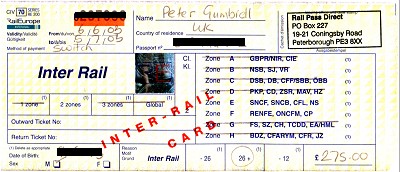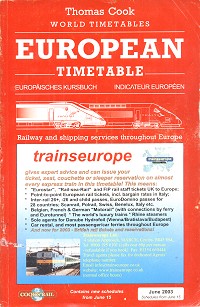| I purchased a 2-zone Interrail pass
as shown (right), figuring that a month wouldn't be long enough
to hop across the whole continent and justify buying the full Europe-wide
pass at an additional 100 pounds. In fact, it turned out that covering
just the two zones was quite demanding. |
 |
I wasn't perturbed at paying the extra cost for the
over-26 version of the pass, being nearly thirty years of age, because
until a few years earlier there was no such pass for old dodders like
me. Upon reaching my mid-twenties I remember feeling despair that I'd
missed my opportunity to ever go Interrailing. But nowadays anybody
can do it, or at least anyone who can save up the necessary cash and
has the desire to stretch their brains a little, because the fact is
that these days one could probably afford several bargain package holidays
for the same cost, if their sole aspiration is to lay on a beach all
day.
Aside from the money issue, the other main reason it
took me so long to make this trip was the belief that I would find other
like-minded people to accompany me, which was an assumption that never
came to fruition. From my days at college and for several years following,
I'd known all sorts of friends who I had hoped would conveniently wish
to travel in the same direction as me, at the same time as me, with
the same fairly low budget as me, with me. This was never likely to
happen; there were too many obstacles halting progress. And those I
have developed good relationships with would always fall short on the
finances if I didn't myself, or be bogged down by work and unable to
find the time.
Travelling alone was still regarded as somewhat unusual
not so long ago, and I didn't feel entirely comfortable with the idea,
but time was starting to tick by and I had to decide to go for it. It
was a decision I wouldn't regret, and I now have a determination to
make many more such travels in the future, whether single or not. So
for anybody else reading this who is unsure about going, I would recommend
getting your skates on before it's too late and your best opportunities
pass by. I met many other single travellers who agreed, and although
the majority of my meetings with people didn't occur on trains, there
were plenty of opportunities to get to know others in youth hostels
and elsewhere. There can be moments, such as on tiring long journeys
and in quiet hostels where some company might be desirable, but a good
book can help see you through! The only real down side is the often
tedious planning required for organizing journeys, tickets and accommodation,
along with the many phone calls that need to be made and drudgy chores
like washing which would always be better when shared, although this
can of course lead to arguments and bickering, so either way you can't
win. Just be prepared for a few inevitable hiccups and hassles along
the way.
Certainly you should ensure that you plan your trip
with enough time to relax, and not dashing about to the next destination
or trying to cover huge distances every single day, as this can become
exhausting. Often my best experiences came when I took extra time to
stop in seemingly unlikely locations, and although it's worth having
a rough idea of where you intend to travel and what you are going to
do, it's best to be flexible with your arrangements and not plan everything
too precisely. The peak season around July and August is best avoided
as it will add to your problems, causing frustrations with fully booked
accommodation, throngs of tourists around every corner, and long delays
queueing to make compulsory reservations on some of the trains. For
sure, advance planning can have its benefits - you could run into problems
if you don't reserve for certain popular trains well in advance, and
many of the hostels in big cities are fully booked days ahead - but
being forced to explore alternatives and change plans at the last minute
is often where the real experiences begin, and the best discoveries
are made.
If you're a first-time rail traveller or have little
experience of Europe, you could opt for one of the shorter 12 or 22-day
passes and stick to northern and western European countries to become
familiar with things. This might sound a bit lame or half-hearted, but
there are many good reasons for doing this when taking the train. Rail
services in these countries are generally far more frequent, reliable
and extensive than those in parts of southern and eastern Europe. There
can be a few culture shocks when travelling to parts of Morocco, Romania,
Turkey or former Soviet states, including regular and thorough border
checks, and invariably larger numbers of people who prey on inexperienced
tourists, offering all manner of undesirable services and operating
various scams. If you are going alone or are in any doubt and want to
play it safe, you can still have a fantastic time around the UK and
Ireland, France, the Benelux countries, Germany, Austria, Switzerland,
the Czech Republic, Italy, Scandinavia, Spain, Portugal and Greece.
It can get just a little more hairy elsewhere; unlikely to upset most
travellers but perhaps best avoided if you're unsure.
Another factor that is well worth considering when
planning your journey, is any language abilities you may possess. It
can be a much more enjoyable experience when you know even a few key
phrases to help you around. Making the smallest attempt to learn some
of the language of the countries you are visiting is better than doing
nothing at all. At the very least, arm yourself with a multi-language
phrase book. There is little more satisfying than coming away from a
ticket counter having acquired the correct items, and having done so
using solely another language, even if it was a bit of a struggle. In
contrast, there is little more humiliating and depressing than travelling
around a country totally unable to utter a word which people can understand,
and having to ask for special assistance from the only person around
who speaks very basic English, if there is anyone, struggling for several
minutes whilst several people queue behind you. It can be surprising
how fiercely independent some nationalities are in speaking nothing
but their native language, however obscure it may be or largely unspoken
in the rest of the world. This applies particularly in the more rural
regions.
Finally, more weight equals less fun. Do everything
you can to minimize your baggage. Visit a camping or outdoor activity
shop and stock up on some miniaturized items, such as a travel towel,
foldaway anorak and, if you're intending to do much sleeping on trains,
a blow-up head pillow. Even look around for tiny slimline pump-action
deodorants, travel toothbrushes; the slightest space and weight-saving
items you can gain. They will all make a difference in the end. I met
some people hauling an enormous second bag around, which they had to
stash in station lockers at each destination. Most of them were tied
down in some way because of it, and admitted that they actually needed
very little of what it contained. I felt comparitively lucky, since
I bought a good quality 35 litre rucksack (one with no easily accessible
compartments on the rear is a good idea to fend off thieves in crowded
places), a flat money belt with a non-irritating fabric for storing
just half of my essential documents and some emergency cash (the others
being kept separately), and a bucket hat which was essential for the
countries with hot climates that I was visiting. It was a tight squeeze
packing everything in and still a considerable load which took some
getting used to, but it was a well-managed arrangement compared to the
cumbersome loads of others.
These are some rather obvious tips, and I could go
on forever making suggestions about every aspect of your planning, but
there are several guide books around which already do just that, and
in much greater detail. This site is primarily about my story, which
begins when you click the link below. Have a good read!
continue to day
1 >>
return to index
|

